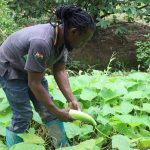In efforts to continue pushing for greater production and variety of fruits and vegetables, the National Agricultural Research & Extension Institute (NAREI) has established several plant nurseries across the country.
The Department of Public Information (DPI) recently made a visit to such one nursery, the NAREI Plant Nursery at Charity, and saw firsthand the variety of plants available to farmers working along the Essequibo Coast and the Pomeroon River. The nursery produces seedlings for soursop, rough lemon, pomegranate, sijan, carambola, coffee, malacca apple and passion fruit, among others.
Julia Mc Alman, the supervisor and general worker of the nursery, while giving DPI a tour, said from the time of its establishment it has been trying to meet the needs and demands of the farmers and offer advice.
“We mainly try to provide plants to the farmers so that they can go plant, produce and supply the nation. They come in with one and two plant-related problems that may be affecting them, and we see how best we can handle them by giving suggestions and if we can’t handle it we refer them to the extension officers.”
She said the plants are not free but they are subsidized, and in this regard, most plant seedlings range from $200 to $500, with grafted and budding plants going for $350. The dwarf golden apple plant, for example, sells for $500.
Demand for plants depends often on the season: “It varies, sometimes it’s seasonal, you got a rush, persons come and demand a certain thing. Let’s say lemon has a great demand, people come to buy lemon, if papaw is on the market they come for that, but every day you get persons come in and buy at various quantities, and as long as we have a great amount, persons would come in and buy.”
The nursery faces the challenge of weather extremes, which does not only affect the plants but the staff of four who tries their best to manage and maintain the variety.
The supervisor also gave encouragement to farmers: “We encourage farmers to come buy the plants, we try to do selective plants to the best of our ability so when we give someone, or when they buy, it must be of standard and quality. Planting is always the best way: you must reap, if you don’t get to sell at least you get to eat and to give and everyone will survive.”
NAREI is actively engaged in adaptive research that focuses on improving crop production/productivity for enhanced food security and rural development.
NAREI’s vision is “to ensure food security, prosperity and livelihoods of all, using technological innovations in agriculture.”








